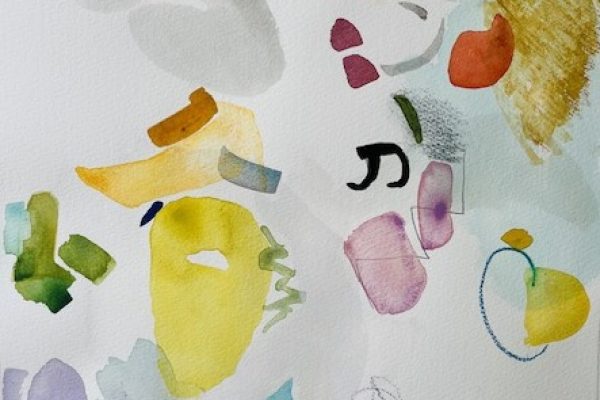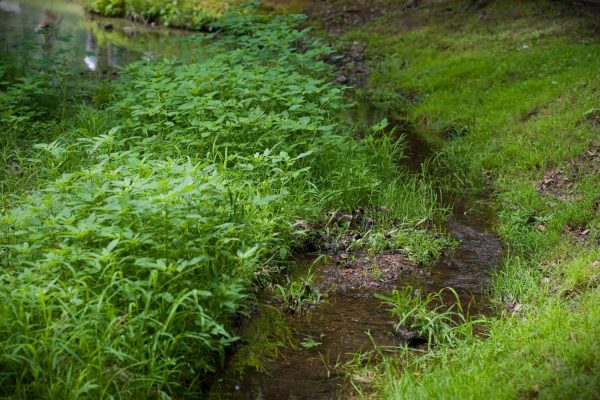Introduction
The ritual of tashlikh is a centuries-old Jewish practice (a minhag, “custom,” rather than a religious obligation or commandment), involving the symbolic casting away of breadcrumbs, stones, seeds, etc., into the sea. This custom is said to draw upon a verse from the book of the prophet Micah: “You will again have compassion on us; you will tread our sins underfoot and hurl [vetashlikh] all our iniquities into the depths of the sea” (Micah 7:19). This embodied practice of physically casting away our sins to enact our cleansing for a new year has been a favorite of Jews through the ages, much to the embarrassment of certain authorities who see it as a merely superstitious custom. (We may choose to relish in this and celebrate its status as a custom that comes from the people rather than the elites.)
Various sources tell us go to the sea or somewhere with fish in it, to remind us that we are akin to fish who are trapped in the net of judgment, and that we should be more like fish, who, according to the Talmud, are not impacted by the evil eye (Berakhot 55b). The Kitzur Shulchan Aruch also suggests that perhaps this is because fish have no eyelids and so their awareness is more attuned to the Divine!
Ritual
Tradition notes that “if there is no river that contains fish you may go to any river, or to a well” (Kitzur Shulchan Aruch 129:21). In this time of shelter-in-place and at-home holidays, we are called to make a further substitution — following the tradition of adapting our rituals to fit contemporary circumstances and values.
In lieu of a river or well, we fill a large bowl or basin about half-way with water and recite the following words, which come from the kapparah ritual, in which a chicken is slaughtered in emulation of the ancient practice of the sacrificial scapegoat, which itself is said to personify the sins of the collective. (The more humane substitution of a bundle of money has become accepted as an authoritative in many communities.)
זֶה חֲלִיפָתִי, זֶה תְמוּנָתִי, זֶה כַּפָּרָתִי.
Zeh halifati, zeh temunati, zeh kaparati.
“This is my exchange, this is my substitute, this is my atonement.”
In lieu of bread crumbs, we gather a bowlful of ice cubes, which will serve as our “sins” for this ritual. We invoke the words of the Psalms that proclaim, “God sends out [mashlikh] Their ice like crumbs: who can stand before Their cold?” (Psalms 147:17),
מַשְׁלִיךְ קַרְחוֹ כְפִתִּים לִפְנֵי קָרָתוֹ מִי יַעֲמֹֽד׃
Mashlikh karkho hefitim; lifnei karato mi ya’amod?
“God casts forth [mashlikh] Their ice like crumbs; Who can stand before Their cold?”
Holding the ice in your hand, recite again the words from kapparah to permit this ritual substitution.
זֶה חֲלִיפָתִי, זֶה תְמוּנָתִי, זֶה כַּפָּרָתִי.
Zeh halifati, zeh temunati, zeh kaparati.
“This is my exchange, this is my substitute, this is my atonement.”
Together, with ice in our hands, we recite the Ashamnu,* voicing our prayers in the first-person plural to recognize that we have all, at some point, done wrong and knowingly or unknowingly committed transgressions ranging from the everyday to the extreme. (Included below is a contemporary adaptation of the traditional prayer.)
As much as we may wish to draw distinction between the failings and harms caused by ourselves and others, the High Holidays invite us to come together as one community, one body seeking healing and harmonious interdependence between each of its cells.
We recite the words of this Ashamnu to acknowledge how we must all do better:
An Ashamnu for the Mindset of Privilege
By Elliot Bat Tzedek
We have abandoned, we have appropriated, we have analyzed, we have arbitrated
We’ve belittled, we have broken faith, we have turned our backs, we have believed the unbelievable
We have grown numb, we’ve given too little, we’ve given too late, we have given up
We have denied, we have distorted, we have hesitated, we have held our tongues
We have victim-blamed, we have zoned out, we have chided, we have chastised
We have taken, we have turned away, we have yielded, we have yet to act
We have kept to ourselves, we’ve been complicit, we have laughed off, we have relied on the law,
We’ve made excuses, we have minimized, we’ve made light of, we have mocked
We have not noticed, we have neglected, we have negated, we have sent our regrets
We’ve averted our eyes, we have forsaken, we have pitied, we’ve failed to imagine new possibilities
We have explained, we’ve criticized, we have rationalized, we’ve refused responsibility
We’ve shamed the innocent, we have silenced, we have suppressed, we have failed to support
We have talked, we have talked, we have talked, but we have not listened
We have not sought the truth, we’ve theorized, we have told ourselves lies, and we have believed them.
As the ice begins to melt in our hands, so may we dissolve the patterns of thought and action that allow us to harm one another. As the ice melts in our hands, so may we soften our judgements of ourselves and one another. As the ice melts in our hands, returning to its identity as water, so may we too make teshuvah, a return to a state of receptivity, adaptation, and potential for healing.
We take time for private meditation and reflection, casting the remaining ice cubes into the water at our own pace, signifying the harms we have caused that we wish to repair, the hurts we have experienced that we wish to heal, and the habits we hold onto that we wish to transform.
We come back together to recite verses from the prophet Micah, which have accompanied this ritual for hundreds of years, invoking the 13 Attributes of Mercy:
“Who is a God like you? Forgiving sin, absolving the transgressions
Of the remnant of your heritage, You who do not cling to anger,
But desire only kindness, You who act mercifully once again,
Subduing the effects of our transgressions, Casting to the ocean waters all our wrongs.
You show faithfulness to Jacob, love to Abraham, as you have sworn to Abraham from days of old.”
Of the remnant of your heritage, You who do not cling to anger,
But desire only kindness, You who act mercifully once again,
Subduing the effects of our transgressions, Casting to the ocean waters all our wrongs.
You show faithfulness to Jacob, love to Abraham, as you have sworn to Abraham from days of old.”
(Micah 7:18–20)
Through our tashlikh, we imagine that a true and complete sending-off is possible. Just as we imagine at Passover that our homes may be devoid of hametz, so too do we imagine that our lives may once again be devoid of harm.
We recite these lines, an adaptation of the formula that concludes the process of bi’ur hametz at Passover time:
כָּל עֲבֵרָה וְחֲטָאָה דְּאִכָּא בִרְשׁוּתִי,
דְּלָא חֲמִתֵּהּ וּדְלָא בִעַרְתֵּהּ וּדְלָא יְדַעְנָא לֵהּ,
לִבָּטֵל וְלֶהֱוֵי הֶפְקֵר כְּעַפְרָא דְאַרְעָא.
דְּלָא חֲמִתֵּהּ וּדְלָא בִעַרְתֵּהּ וּדְלָא יְדַעְנָא לֵהּ,
לִבָּטֵל וְלֶהֱוֵי הֶפְקֵר כְּעַפְרָא דְאַרְעָא.
Kol aveirah vekhata’ah d’ika virshuti,
dela hamiteih udla viarteih udla yedana leih,
libateil velehevei hefkeir ke’afra de’ar’a.
dela hamiteih udla viarteih udla yedana leih,
libateil velehevei hefkeir ke’afra de’ar’a.
“Let each transgression & mistake for which I am responsible,
‘which I have not seen or removed, or of which I am unaware,
be hereby nullified and ownerless as the dust of the earth.'”
‘which I have not seen or removed, or of which I am unaware,
be hereby nullified and ownerless as the dust of the earth.'”
In traditional tashlikh, what we cast off is swept away.
Today, what we cast off sits before us, dissolving and changing, but here all the same.
You are invited to reflect on how you move forward from this act of tashlikh — both spiritually (how will you move forward with your transgressions, wounds and baggage?) and physically (how will you deal with this water?).
Perhaps you will choose to imbibe the water to signify integration, to dispose of it by pouring it into your plumbing to remove it from your domain, or to use it to water your plants to suggest growth coming from hardship.
Below, we present a biblical ritual to help us send away that which we wish to be rid of, using salt to spiritually purify our waters. (We recommend not using the salted water to water your plants, as it can damage and kill them!)
To help us make our tashlikh an effective “sending off,” we recall and re-enact a miracle from our tradition.
“The men of the town said to Elisha, ‘Look, the town is a pleasant place to live in, as my lord can see; but the water is bad and the land causes bereavement …’ He responded, ‘Bring me a new dish and put salt in it.’ They brought it to him; he went to the spring and threw [va–yishlakh] salt into it. And he said, ‘Thus said the LORD: I heal this water; no longer shall death and bereavement come from it!’ The water has remained wholesome to this day, in accordance with the word spoken by Elisha.” (2 Kings 2:19–22)
Take a handful of salt, and cast it into the water as you recite the following words, and any final prayers and aspirations for cleansing you harbor:
וַיֹּ֜אמֶר כֹּה־אָמַ֣ר יְהֹוָ֗ה רִפִּ֙אתִי֙ לַמַּ֣יִם הָאֵ֔לֶּה לֹא־יִהְיֶ֥ה מִשָּׁ֛ם ע֖וֹד מָ֥וֶת וּמְשַׁכָּֽלֶת׃
Vayomer koh amar Adonai: Rifiti lamayim ha’eleh, lo yihyeh misham od mavet um’shakalet.
“Thus said the Lord: I heal this water;
no longer shall death and bereavement come from it”
no longer shall death and bereavement come from it”
Taste a bit of this water. As you move through the remainder of these High Holy Days, keep this intention in mind like the taste of salt on your lips.
You may wish to leave this water in its bowl as a kind of altar or object for meditation through the duration of the High Holidays, or you may wish to dispose of it by emptying it into your plumbing, invoking the verse from Zohar: “Whatever falls into the deep is lost forever” (Vayikra 101a).











